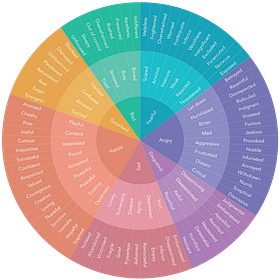Whether we like it or not, as human beings, we experience emotions. The existence of emotions isn’t inherently bad, but it can feel very scary to acknowledge our feelings, especially when they are BIG FEELINGS. Many of us believe that if we acknowledge our feelings and open up, we will never be able to close up again.

That we might never be in control of our feelings if we give them too much space.
However, naming our feelings is a crucial skill in addressing moral injury and moral distress because it allows us to process complex feelings like guilt, shame, or betrayal.
By identifying and articulating these emotions, people like us can begin to understand and manage the intense psychological impact, fostering pathways toward healing.
Use Your Words
You may have heard advice like “use your words” or "talk it out" when dealing with difficult emotions. This practice, known as "affect labeling," is more than a feel-good recommendation; it's grounded in neuroscience and has significant emotional benefits. Affect labeling, or identifying and naming our emotions, has been shown to reduce emotional intensity and support psychological well-being.
How Affect Labeling Regulates Emotions
Affect labeling helps us with emotional regulation. Unlike strategies that require reframing thoughts or shifting our perspective, affect labeling primarily involves acknowledging emotions as they arise without trying to change or analyze them immediately.
When we name our emotions—saying to ourselves, "I feel anxious" or "I'm angry"—we are engaging the brain in a subtle yet effective way. Neuroscientists have found that this process activates areas of the brain associated with cognitive control, such as the ventrolateral prefrontal cortex while calming the amygdala, a region involved in emotional responses.
Psychological and Physical Benefits
One remarkable outcome of affect labeling is its ability to decrease the physiological intensity of emotions. This allows me to significantly shift my own emotional burdens, but the evidence isn’t limited to personal experience.
Studies have shown that when people practice naming their feelings, they experience lower heart rates, reduced skin conductance (a measure of emotional arousal), and a general sense of calm. By labeling emotions, individuals not only feel less distressed but also experience improvements in self-awareness and emotional resilience.
Labeling emotions can also improve behavior and performance in stressful situations. For instance, students who labeled their test-related anxiety before exams reported feeling calmer and performed better than those who did not. By reducing emotional reactivity, affect labeling can help in high-stakes situations where clear thinking and focus are critical.
The Role of Self-Reflection and Uncertainty Reduction
Naming emotions facilitates self-reflection, allowing us to pause and examine our internal states with curiosity - rather than reactivity. This process not only encourages self-awareness but also helps reduce the ambiguity of our emotional experiences. When we name our feelings, we categorize them, creating a sense of order and predictability. This reduction in uncertainty can be particularly beneficial in high-stress scenarios or in managing chronic anxiety, as it helps the brain to interpret these emotions as manageable rather than overwhelming.
A Practical and Accessible Tool for Everyone
Affect labeling is an accessible practice that doesn't require specialized training or tools, making it an ideal approach for everyday emotional challenges. Whether it's labeling our own feelings in private or openly discussing them in conversation, this simple act provides a valuable outlet. Over time, regularly engaging in affect labeling can enhance our capacity to manage stress, build resilience, and improve emotional intelligence.
Tool: The Feelings Wheel
Many of us have a pretty limited emotional vocabulary. One tool to address this is the Feelings Wheel. Developed by therapist Gloria Wilcox in 1982, the feelings wheel is a powerful tool for identifying and understanding our emotions. Comprising six core emotions—sad, mad, scared, joyful, powerful, and peaceful—the wheel helps us move from broad emotion…
Beyond Words: The Potential for Lasting Impact
What makes affect labeling particularly powerful is its unique, lasting form of emotional regulation. I feel I’ve gotten better at it with practice.
Unlike more effortful techniques, labeling emotions can quickly become a habit that supports emotional well-being in subtle yet profound ways. For coaches, therapists, educators, and even friends, encouraging others to identify and express their feelings can be a transformative practice. When I lead moral distress interventions, I routinely ask participants to take a moment and identify at least two feeling words that they identify as part of their experience.
In our fast-paced lives, it’s easy to overlook the power of simple actions like naming our emotions. Yet, science shows that this practice can lead to calmer, more grounded lives and even improve performance under pressure.
So, the next time you’re feeling overwhelmed, take a moment to put your feelings into words—you might be surprised at the relief it brings.
References:
Torre, J. B., & Lieberman, M. D. (2018). Putting Feelings Into Words: Affect Labeling as Implicit Emotion Regulation. Emotion Review, 10(2), 116-124. https://doi.org/10.1177/1754073917742706



